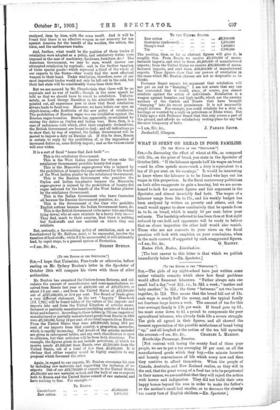[TO THE EDITOR OP THE SPECTATOR."]
hope that Unionists, Free-trade or otherwise, before resting on Mr. Sydney Buxton's letter in the Spectator of October 24th will compare his views with those of other
authorities.
Mr. Buxton has examined the Custom-house Returns, and cal- culates the amount of manufactures and semi-manufactures re- ceived from Russia last year at £400,000 out of X25,670,000, or about 1.5 per cent. ; and from the United States at X13,200,000 out of X127,000,000, or 10•4 per cent. The Board of Trade gives a very "different statement. In the new " Inquiry " Blue-book [Cd. 1,761] will be found tables of the values of the imports and exports into and from the United Kingdom of articles manu- factured or partially manufactured (excluding articles of food and drink and tobacco). According to these tables (p. 73) our imports of mannfactured or partially manufactured goods from Russia in 1902 were X3,100,000, being 12 per cent. of our total imports from Russia. From the United States they were £20,900,000, being 16.5 per cent. of our imports from that country, a proportion, moreover, which is rapidly increasing. Full details of -the articles included are given in subsequent tables, and any such classification is open to criticism, bit that criticism will be from both directions. For example, the figures given do not include petroleum, of which we receive nearly £1,500,000 from Russia, over X3,500,000 from the United States, out of a total of less than X5,250,000. It is obvious that either country would be highly sensitive to any proposal which favoured the other.
Again, in regard to our exports, Mr. Buxton overstates his case by including raw materials and suggesting the inclusion of re- exports. Out of our X23,750,000 of exports to the United States, 44,250,000 are raw material or food, and the bulk of our re-exports both to Russia and the United States consist of raw material, and have nothing to fear. For example:— To. Russ's.
Caoutchonc X1,000,000 Raw cotton
... 2,400,000 To TITE UNITED STATCS.
Raw cotton 42,100,000 Goatskins (undressed) ... 1,2011,000 Sheep's wool ... 1,500,1000 Tin 2,200.000
The position, then, so far as abstract figures will give it, is roughly this. From Russia we receive X3,100,000 of manu- factured imports, and send to them 26,200,000 of manufactured exports; the United States we receive X20,900,000 of manu- factured imports, and send them £19,500,000 of manufactured exports. These figures show that our powers of retaliation in the cases which Mr. Buxton chooses are not so despicable as he thinks.
Professor Smart repeats his argument that retaliation will not put an end to " dumping." I am not aware that any one has contended that it would, since, of course, you cannot retaliate against the action of individuals. Retaliation is a weapon against bounties and high tariffs, which are the nursing mothers of the Cartels and Trusts that have brought " dnmping " into its recent prominence. It is not necessarily simple defence. For example, you could retaliate for a duty on herrings or worsted by a reply on petroleum or Rhine wines. But I fully agree with Professor Smart that this only covers a part of the ground, and affords no satisfactory resting-place for any but the most temporary of halts.
J'ordanhill, Glasgow.


















































 Previous page
Previous page